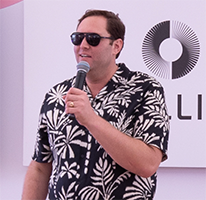This September, retail chain Macy’s will debut several television commercials featuring a variety of notables, including domestic diva Martha Stewart; real estate developer Donald Trump; rap impresario Russell Simmons; chef Emeril Lagasse; and Jessica Simpson, who perennially defines the question “Why are we still paying attention to this woman?”
These are interesting choices in spokespeople, given their spotty records as citizens of merit. Stewart and Trump’s travails with the courts (criminal for her, bankruptcy for him) are likely to play well with the shoplifting set. Jessica Simpson has single-handedly given bubbleheadedness a bad name.
There are few Nobel laureates in the Macy’s campaign, although Russell Simmons has been branching into philanthropic work of late, and may find himself on the short list if he’s not careful. Nor are the ads exactly laden with literary figures, unless one considers performing artists Madonna and Usher poets.
This, in and of itself, is a small complaint. Here’s a larger one: The common attribute among these celebrity choices is that they are all masters of self-promotion. The question is whether Macy’s message is going to be subsumed by the obvious jokes and catcalls many of these spokespeople will engender. Yes, the campaign is going to center around these folks making fun of their public images. No, I don’t think it’s going to work.
This isn’t a case of a Tony Randall or a Jack Klugman lugging out the persona of much-loved characters Felix Unger and Oscar Madison. Macy’s will be at the mercy of the real-life shenanigans of its featured players.
Now, under the theory of there is no bad publicity as long as they spell the brand’s name correctly, the potential for disaster must not have seemed a bad thing during the initial campaign brainstorming session. What the creative minds behind this failed to realize was that the Felix and Oscar characters can be shaped into extending the brand’s message, as they were with Eagle Potato Chips. Even bad boy Bart Simpson successfully sold Butterfingers candy bars.
However, the real-life personas of those chosen for the Macy’s spots are so big that the Macy’s message is bound to be obscured. The moment Emeril Lagasse utters his first “Bam!” and promises to kick something up a notch, Macy’s will have lost control of its own promotion. Folks will remember Emeril, and Martha, and The Donald. Will they remember the store?
There are ways to link celebrity to product. During the mid-1990s, The Gap ran a campaign centered on vintage photos of luminaries wearing khaki pants – albeit not necessarily Gap khakis. The campaign featured Humphrey Bogart, James Dean, Jack Kerouac, Marilyn Monroe, Pablo Picasso – all of whom were, indeed, wearing khakis in untouched photos, and all of whom were dead at the time of the campaign, and thus minimally able to embarrass the chain.
Even this approach isn’t foolproof: Wags pointed out that Adolf Hitler wore khakis, too, much to The Gap’s displeasure. But this, in a grotesque fashion, proved the efficacy of the campaign: The focus of the ads was the khakis, in equal proportion with the celebrity.
Bankruptcy, prison, thuggery and idiocy. And the potential for a misstep by a set of very flawed spokespeople. These are the qualities on which Macy’s latest television campaign is sinking $100 million, according to the Wall Street Journal. I wish it well.
From afar.
 Network
Network

